|
|
|
Sort Order |
|
|
|
Items / Page
|
|
|
|
|
|
|
| Srl | Item |
| 1 |
ID:
107222


|
|
|
| 2 |
ID:
149841


|
|
|
|
|
| Summary/Abstract |
For many Small Island Developing States (SIDS) the cost of producing electricity from imported fossil fuels is so high and the cost of renewable energy technology has fallen so significantly that transitioning towards renewable energy is likely to produce cost savings. A recent workshop at NYU School of Law, which brought together SIDS utility representatives with a leading renewable energy developer and other stakeholders, provided strong support for this prediction. Utilities are likely to own the majority of renewable energy assets in SIDS and will therefore be the initial custodians of any cost savings renewable energy provides. This raises a key policy question: to what extent should SIDS utilities pass on these savings to consumers by lowering electricity rates? We analyze this overlooked element of energy policy and highlight undesirable consequences that complete disbursement of the savings to consumers could cause.
|
|
|
|
|
|
|
|
|
|
|
|
|
|
|
|
| 3 |
ID:
098695


|
|
|
|
|
| Publication |
2010.
|
| Summary/Abstract |
The effect on the cost of electricity from concentrating solar power (CSP) plants of the solar multiple, the capacity factor and the storage capacity is studied. The interplay among these factors can be used to search for a minimal-cost objective that can serve as a technical criterion to guide in the design of economic incentives for CSP plants. The probability-density function of irradiation is used in conjunction with screening models to evaluate the performance characteristics and costs of concentrating solar power plants. Two technologies have been analyzed in this study: parabolic-trough and tower plants. The results provide information to define the optimal operational range as a function of the desired objective. Thus, it is possible to derive a technical criterion for the design of CSP plants which optimizes the solar electricity produced and its generation cost. The methodology is applied to Spain, and the analysis of the results shows that a solar energy production of 37 kWh/m2/year for tower plants and 66 kWh/m2/year for parabolic-trough ones define the approximate optimal working conditions for the mean DNI in Spain.
|
|
|
|
|
|
|
|
|
|
|
|
|
|
|
|
| 4 |
ID:
123591


|
|
|
|
|
| Publication |
2013.
|
| Summary/Abstract |
We bring together a collection of papers that were presented at the inaugural event of the Asia-Europe Energy Policy Research Network (AEEPRN), held at Singapore in May 2012. The idea for creating AEEPRN was in response to the growing importance of energy in Asia and Europe's relations and to our shared belief that energy will become a more significant aspect of these relations over the forthcoming years and decades. The papers presented here cover the following themes: wind energy, biofuels, natural gas and gas pipelines, exergy and manufacturing, green energy co-operation, coal, unconventional gas and solar energy.
|
|
|
|
|
|
|
|
|
|
|
|
|
|
|
|
| 5 |
ID:
168667
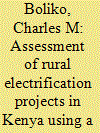

|
|
|
|
|
| Summary/Abstract |
This research is driven by the goal to develop human survivability studies, a solution oriented, trans-disciplinary academic approach for resolving multiple complex societal challenges. Given persisting poverty and inequality in rural areas of developing countries, as well as their vulnerability to the effects of climate change, there are high expectations that rural electrification using renewable energy can contribute to their sustainable development. We therefore use a sustainability framework to assess the contributions of four electrification projects in rural Kenya in ensuring the long-term well-being of local residents and future generations. Our results show that off-grid electrification projects run by the private sector were the better performers in the assessment. While more research is necessary to improve robustness, our preliminary policy recommendations are that Kenyan policy makers should provide further support to private sector-led off-grid solar electrification efforts.
|
|
|
|
|
|
|
|
|
|
|
|
|
|
|
|
| 6 |
ID:
150351


|
|
|
|
|
| Summary/Abstract |
In this study we aim at assessing the potential of European regions to solar power generation and its comparison with recent European Union (EU) incentives for the development of this renewable energy source. In this study we use a multi-criteria assessment (MCA) supported by Geographical Information System (GIS) to combine already existing information on solar radiation with other geographical factors such as slope, land use, urban extent and population distribution, as well as proximity to the power grid to generate a suitability map for photovoltaic (PV) power plants across the EU at high spatial resolution. A validation exercise showed that the resulting suitability map is a good predictor of appropriate locations for the deployment of PV power plants. The suitability map was in addition compared to the regional distribution of European funds for development of solar energy from the EU Cohesion policy (2007–2013 programme). Regions were classified according their overall suitability for solar energy power systems and the allocated solar investments by the EU Cohesion policy. This analysis allowed to identify potential mismatches between fund allocations and actual regional suitability for solar energy. It is recommended that future fund allocations take into account suitability criteria for solar energy for optimised results of public policies.
|
|
|
|
|
|
|
|
|
|
|
|
|
|
|
|
| 7 |
ID:
181459


|
|
|
|
|
| Summary/Abstract |
Low carbon development involves profound changes in existing countries’ governing structures. Recent studies have shown that significant benefits to low carbon development in developing countries can be achieved from energy sector transitions. This paper argues that energy transition in Botswana which involves reduction of dependence on coal-generated electricity and increase in the uptake of solar energy can only be achieved through regime-based reconfigurations driven by deliberate government action and political will. It draws on energy transition literature to examine whether existing policy instruments can drive the desired transition. Through in-depth qualitative analysis, it identifies barriers that impede transition attempts to date. As an effort to overcome regime level barriers in particular, the paper proposes several low-cost changes in the existing electricity regime to facilitate a wider energy sector transformation.
|
|
|
|
|
|
|
|
|
|
|
|
|
|
|
|
| 8 |
ID:
125474


|
|
|
|
|
| Publication |
2013.
|
| Summary/Abstract |
In order to avoid irreversible damage to global ecosystems, new 'green' technologies are needed, some of which are nowhere near commercial maturity. In these cases, governments may create temporary rents to make investments 'artificially' attractive, but the creation of such rents involves risks of faulty allocation and political capture. This article first highlights the importance of managing rents effectively in promoting 'green' technologies; it then shows how India's National Solar Mission has been remarkably effective in triggering solar investments and managing the necessary subsidies, e.g. through a process of competitive reverse bidding for tariffs. Policy design and implementation also reflect considerable experimentation and learning. Some risks remain, especially regarding the enforceability of renewable energy quotas at the level of Indian states.
|
|
|
|
|
|
|
|
|
|
|
|
|
|
|
|
| 9 |
ID:
150358


|
|
|
|
|
| Summary/Abstract |
The inevitable depletion of fossil resources and increasing atmospheric greenhouse gas concentrations demonstrate the need for renewable energy conversion technologies for a sustainable economy. Intermittencies and variability in availability of renewable energy sources are the challenges for uninterrupted energy supply, which can be overcome by large scale energy storage facilities. Pumped hydroelectric energy storage is an efficient but a very low energy density energy storage method that dominates the current energy storage market with ~96% share. We first present a recently developed potential solution for large scale efficient and dense energy storage: closed loop carbon storage cycles and a specific example dimethyl ether storage cycle. We then discuss the relevant US energy storage regulations, policy initiatives, their status, and potential modifications that will contribute to the invention and implementation of novel energy storage systems.
|
|
|
|
|
|
|
|
|
|
|
|
|
|
|
|
| 10 |
ID:
132646


|
|
|
|
|
| Publication |
2014.
|
| Summary/Abstract |
This article offers the first national examination of the determinants of adoption of wind and solar energy generation on U.S. farming operations. The inclusion of state policies and characteristics in a multilevel modeling approach distinguishes this study from past research utilizing logit models of technology adoption which focus only on the characteristics of the farm operation. Results suggest the propensity to adopt is higher for livestock operations, larger farms, operators with internet access, organic operations, and newer farmers. The results find state characteristics such as solar resources, per capita income levels, and predominantly democratic voting increasing the odds of farm adoption. This research suggests the relevance of state policy variables in explaining farm level outcomes is limited, although in combination best practice net metering and interconnection policies-policies designed to encourage the development of small scale distributed applications-are shown to increase the likelihood of farm solar and wind adoption. The prevalence of electric cooperatives-which are often not subject to state renewable energy policies and often service farms-is negatively related with the propensity to adopt and suggests that policy design may be a factor
|
|
|
|
|
|
|
|
|
|
|
|
|
|
|
|
| 11 |
ID:
111332


|
|
|
|
|
| Publication |
2012.
|
| Summary/Abstract |
The world is facing the severe challenges of energy depletion and carbon dioxide (CO2) emissions, and solar energy is considered to be a promising source of renewable energy and effective solution. However, the application of solar energy is limited in practice due to various barriers. Based on data collected from a survey of practice, this paper identifies the key barriers to the deployment of solar photovoltaic (PV) energy systems in Hong Kong. These include "high initial and repair cost", "long payback period", "inadequate installation space and service infrastructure", "lack of participation of stakeholders/community in energy policy" and "lack of incentives by legislation and regulation". Recommendations for addressing these barriers are proposed. For example, the high cost of solar PV energy systems can be reduced by the development and mass production of low-cost fabrication technologies and high performance PV technologies. Solar thermal applications should be encouraged as they are much more economical than solar PVs. It is also recommended that the Hong Kong Government adopt strategies to encourage a greater use of solar energy systems. The results from this study not only provide useful information for the Government, the private sector and consumers in Hong Kong but are also likely to apply equally to other similar regions around the world.
|
|
|
|
|
|
|
|
|
|
|
|
|
|
|
|
| 12 |
ID:
132594


|
|
|
|
|
| Publication |
2014.
|
| Summary/Abstract |
Whereas the technical feasibility of solar water heaters (SWHs) has long been established, the economic feasibility of SWHs in regional China remains to be examined. This paper constructs cost models to calculate costs per unit energy saving of SWHs in 27 Chinese provincial capital cities. The cost effectiveness of SWHs is examined at the national level. At a micro level, we analyze the financial attractiveness of consumers' investment in SWHs. A panel data model is employed to evaluate the effectiveness of a subsidy program in rural China. The results show that SWH costs, ranging from 0.305 to 0.744 CNY/kW h, are much lower than those of other major renewable energies across China. This finding indicates that the diffusion of SWHs is a cost-effective way to reach China's renewable energy target. For consumers, incentive programs for SWHs are needed to improve the financial attractiveness of the devices in China. Existing subsidy policies for rural China have failed to significantly enhance the deployment of SWHs. The causes of the failure are examined and a new incentive program is suggested for rural areas of the country.
|
|
|
|
|
|
|
|
|
|
|
|
|
|
|
|
| 13 |
ID:
168696
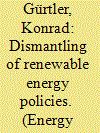

|
|
|
|
|
| Summary/Abstract |
Despite their increasing cost competitiveness, the continued expansion of renewable energy remains dependent on policy support. Moreover, the dismantling of renewable energy policies in a number of former pioneer countries indicates that continued policy support is not a foregone conclusion. Yet, in light of the accelerating expansion of renewable energy, the dismantling of renewable energy policies has captured comparatively less attention than the rapid spread of support schemes. This article seeks to fill this important knowledge gap by developing and testing a framework for the analysis of policy dismantling processes in the renewable energy sector. It applies the framework to conduct a comparative analysis of policy dismantling in Spain and the Czech Republic. Both countries represent European pioneers of renewable energy support who subsequently dismantled their policies. The paper finds that the inter-relationship between policy design and the broader configuration of the political economy in the energy sector are key for understanding dismantling processes. It offers a number of conclusions for the design of more robust renewable energy support policies.
|
|
|
|
|
|
|
|
|
|
|
|
|
|
|
|
| 14 |
ID:
142077
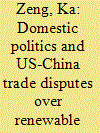

|
|
|
|
|
| Summary/Abstract |
In this article I draw on the two-level game approach to analyze the influence of domestic politics on US-China trade disputes in alternative energy, especially in solar energy. I suggest that the difficulty Washington faces in getting China to address market access barriers in alternative energy needs to be viewed in light of both the coalitional dynamics in the United States resulting from the specific bilateral trade and investment relationship in this sector and Beijing's willingness to use industrial policy to foster economic competitiveness in nascent industries. Specifically, as China occupies the middle of the supply chain in the solar industry, both downstream users of low-cost Chinese imports and exporters of upstream products to China have voiced strong concerns about US trade action. Such domestic opposition, coupled with the importance of industrial policy for defending the country's long-term interests in a “strategic emerging” sector such as alternative energy, substantially constrains Washington's ability to influence Chinese policies.
|
|
|
|
|
|
|
|
|
|
|
|
|
|
|
|
| 15 |
ID:
093336
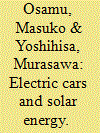

|
|
|
| 16 |
ID:
150754


|
|
|
|
|
| Summary/Abstract |
High demand for photovoltaic (PV), battery, and small-scale combined heat and power (CHP) technologies are driving a virtuous cycle of technological improvements and cost reductions in off-grid electric systems that increasingly compete with the grid market. Using a case study in the Upper Peninsula of Michigan, this paper quantifies the economic viability of off-grid PV+battery+CHP adoption and evaluates potential implications for grid-based utility models. The analysis shows that already some households could save money by switching to a solar hybrid off-grid system in comparison to the effective electric rates they are currently paying. Across the region by 2020, 92% of seasonal households and ~75% of year-round households are projected to meet electricity demands with lower costs. Furthermore, ~65% of all Upper Peninsula single-family owner-occupied households will both meet grid parity and be able to afford the systems by 2020. The results imply that economic circumstances could spur a positive feedback loop whereby grid electricity prices continue to rise and increasing numbers of customers choose alternatives (sometimes referred to as a “utility death spiral”), particularly in areas with relatively high electric utility rates. Utility companies and policy makers must take the potential for grid defection seriously when evaluating energy supply strategies.
|
|
|
|
|
|
|
|
|
|
|
|
|
|
|
|
| 17 |
ID:
102867


|
|
|
|
|
| Publication |
2010.
|
| Summary/Abstract |
The energy transition from fossil fuels to renewable sources of energy is moving much faster than could be imagined a few years ago. Given this unanticipated acceleration, it is widely believed that renewable energy is attaining a momentum which is of great significance in the context of the global energy and climate situation. Whereas the 20th century was marked by the globalisation of the world energy economy as countries everywhere turned to oil, much of it coming from the Middle East, without doubt, this century will see the localisation of energy production as the world turns to wind, solar, tidal, geothermal and other forms of energy. This paper aims to expound the potential of the four main "renewable" energies i.e., wind, solar, ocean and geothermal, including potential assessment of their growth in the (IOR) and the attendant challenges in their future intensification and acceptability. As any study on this topic would bring out, the plans and investment of China are staggering and will have profound implications for the emerging geopolitics.
|
|
|
|
|
|
|
|
|
|
|
|
|
|
|
|
| 18 |
ID:
110411
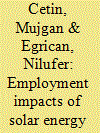

|
|
|
|
|
| Publication |
2011.
|
| Summary/Abstract |
Solar energy is considered a key source for the future, not only for Turkey, also for all of the world. Therefore the development and usage of solar energy technologies are increasingly becoming vital for sustainable economic development. The main objective of this study is investigating the employment effects of solar energy industry in Turkey. Some independent reports and studies, which analyze the economic and employment impacts of solar energy industry in the world have been reviewed. A wide range of methods have been used in those studies in order to calculate and to predict the employment effects. Using the capacity targets of the photovoltaic (PV) and concentrated solar power (CSP) plants in the solar Roadmap of Turkey, the prediction of the direct and indirect employment impacts to Turkey's economy is possible. As a result, solar energy in Turkey would be the primary source of energy demand and would have a big employment effects on the economics. That can only be achieved with the support of governmental feed-in tariff policies of solar energy and by increasing research-development funds.
|
|
|
|
|
|
|
|
|
|
|
|
|
|
|
|
| 19 |
ID:
184571


|
|
|
| 20 |
ID:
118104


|
|
|
|
|
|
|
|